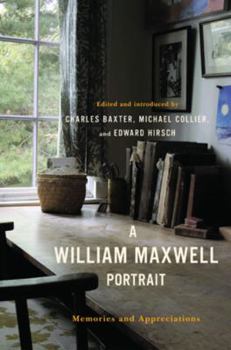A William Maxwell Portrait: Memories and Appreciations
Select Format
Select Condition 
Book Overview
William Maxwell, who died in July 2000, was revered as one of the twentieth century's great American writers and a longtime fiction editor at The New Yorker. Now writers who knew Maxwell and were inspired by him--both the man and his work--offer intimate essays, most specifically written for this volume, that bring him back to life, right there in front of us.
Alec Wilkinson writes of Maxwell as mentor; Edward Hirsch remembers him in old age; Charles Baxter illuminates the magnificent novel So Long, See You Tomorrow; Ben Cheever recalls Maxwell and his own father; Donna Tartt vividly describes Maxwell's kindness to herself as a first novelist; and Michael Collier admires him as a supreme literary correspondent. Other appreciations include insightful pieces by Alice Munro, Anthony Hecht, a poem by John Updike, and a brief tribute from Paula Fox. Ending this splendid collection is Maxwell himself, in the unpublished speech The Writer as Illusionist.
Alec Wilkinson writes of Maxwell as mentor; Edward Hirsch remembers him in old age; Charles Baxter illuminates the magnificent novel So Long, See You Tomorrow; Ben Cheever recalls Maxwell and his own father; Donna Tartt vividly describes Maxwell's kindness to herself as a first novelist; and Michael Collier admires him as a supreme literary correspondent. Other appreciations include insightful pieces by Alice Munro, Anthony Hecht, a poem by John Updike, and a brief tribute from Paula Fox. Ending this splendid collection is Maxwell himself, in the unpublished speech The Writer as Illusionist.
Format:Hardcover
Language:English
ISBN:0393057712
ISBN13:9780393057713
Release Date:August 2004
Publisher:W. W. Norton & Company
Length:234 Pages
Weight:0.85 lbs.
Dimensions:1.0" x 6.3" x 9.1"
Customer Reviews
1 rating
For All Of Us Who Love William Maxwell
Published by Thriftbooks.com User , 20 years ago
Fourteen writers who knew and loved the incredible William Maxwell have written beautifully about him in this fine collection of "memories and appreciations." In addition to the editors, Charles Baxter, Michael Collier and Edward Hirsch, other writers included are John Updike, Donna Tartt, Alice Munro, Shirley Hazzard, Anthony Hecht, Richard Bausch, Paula Fox, Alec Wilkinson, Benjamin Cheever, Ellen Bryant Voigt, and Annabel Davis-Goff. There is also a previously unpublished speech of Mr. Maxwell's. It is almost as if these writers read each other's notes since they express practically the same sentiments with only minor differences as they each see him through the prisms of their own experiences. They describe him as loving, generous, kind, gentle, modest, dignified, thoughtful, tremendously interested in the lives of other people, never glib. The superlatives go on and on. Born in Lincoln, Illinois, in 1908, Mr. Maxwell apparently had an idyllic childhood until he lost his mother to influenza during the horrible epidemic of 1918. That single event, which he wrote about again and again in both his fiction and other writings, shaped the rest of his life. According to Mr. Wilkinson, when Mr. Maxwell's mother died, he "gave up any belief in a god who protected human happiness. No sensible person can fail to be astonished by creation, he thought, but the idea of an old man watching over individual lives, a being who judged, kept track, and intervened, who favored one person over another, a figure from a story-- such a version had no meaning for him." Ms. Davis-Goff says he believed in love, not in God, and that he wrote about the redeeming nature of love. Edward Hirsch in one of the most moving essays in the collection-- that made my eyes burn-- reminds us that Mr. Maxwell's religion was literature. He was happily married to his wife Emily for many years and died at the age of 92 only 8 days after her death. As an editor for THE NEW YORKER for forty years, Mr. Maxwell published many fine writers including Eudora Welty, John Cheever, John Hersey, John Updike, Vladimir Nabokov et al. These for the most part are beautiful essays-- John Updike's contribution is a poem-- written about a most beautiful man. Many of them should cause those of us who already adore William Maxwell to reread him or introduce him to a new generation of lovers of literature. One is reminded again of the difference between fine literature and popular fiction and why Updike and Tom Wolfe should never be discussed in the same paragraph. There are many wondrous sayings of Mr. Maxwell included here: that all he asked of life is the privilege of being able to read, that the the only part he would miss about dying was that he couldn't read Tolstoy, that either you retire from life or you advance to meet it, that when he first read Yeats' early poetry he "felt as if fairy dust had been sprinkled on him." And you have to love someone who says that "every writer has a lifetime ration o





